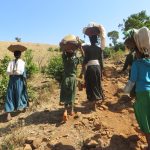Ethiopian agriculture in the news for the period Dec 01 - 15, 2025 highlighting current stories in agriculture and related topics in the country. Read more>>
Micro-, small- and medium-sized enterprises and their role in sustainable healthy diets in Ethiopia
Ethiopia is working to transform its food system through a set of game changers that strive to change Ethiopia’s agricultural production patterns and to help improve consumption of under-consumed foods. The goal is to improve diet quality for Ethiopian consumers and households, which can only take place if consumers are more aware of what types […]
Half of Tigray’s agricultural land left uncultivated
Ethiopian agriculture in the news for the period Nov 16 - 30, 2025 highlighting current stories in agriculture and related topics in the country. Read more>>
High-level delegation visits GM Maize farm, showcases agricultural innovations
Ethiopian agriculture in the news for the period Nov 01 - 15, 2025 highlighting current stories in agriculture and related topics in the country. Read more>>
Armed conflict, community-based cash transfers, and social cohesion: Evidence from a randomized intervention in Ethiopia
Amid a surge in armed conflicts in Africa, the impact of armed conflicts on social cohesion and potential avenues to rebuild social cohesion in conflict-affected settings remain active areas of inquiry. Most importantly, identifying instruments and interventions that can effectively strengthen social cohesion in conflict-affected settings can inform and facilitate peace-building efforts. We examine whether […]
- « Previous Page
- 1
- …
- 3
- 4
- 5
- 6
- 7
- …
- 103
- Next Page »




